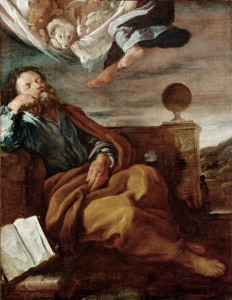Acts 11:1-18
This text is used for the Lectionary Year C on April 24, 2016.

The story of Gentile inclusion into the Church begins at the end of chapter nine where Peter (who is likely preaching a Joppa revival) is put up (as preachers are) in a home… the home of Simon the Tanner. It’s an off-the-cuff, by-the-way kind of aside, but so very significant spiritually because, as they say, “when the student is ready the teacher shows up.”
A close spiritual reading of the text would affirm that Simon the Rock needs Simon the Tanner. There is an experience that the Apostle must have in order to receive the next Word. Each night after his Joppa revival, he is stepping over the visceral line when he steps over the unclean threshold of Simon the Tanner’s home. This experience is preparing him for the next experience and is a part of the synchronicity leading to a vision that leads to… a New Vision. Good spiritual, biblical teaching would affirm that there are prerequisites to visions and Peter gets his prerequisite in Joppa.
As previously noted, each page of Acts is the story of new things unfolding in the world and unfolding unpredictably. They seem simply to be “in the flow.” Who would have thought that, Saul the Great Persecutor would become Paul the Great Apologist? Who would have thought that Stephen’s tragic death would scatter believers as evangelists into the known world? The Church’s responsiveness to what is unfolding is a major theme.
However, it’s not “willy-nilly” responsiveness and even though Acts is full of serendipity we also see an emerging epistemology in the Church. They are discerning day by day what is true and what to do. Cherished beliefs and behaviors are changing rapidly but there remain patterns of knowing, which are manifested not only in those early years of the Church but throughout our 2000-year history. Acts is a witness to our understanding of revelation and authority, as is our long and wide Tradition.
In chapters ten and eleven, we see some of these “ways of knowing” at work, several of which are mystical (not exactly a “go-to” in recent centuries for Baptists). First, there is this vision that Peter has up on the roof. (Some might even call this an un-kosher nightmare.) The vision is connected to both noontime prayers and the noontime meal and comes to him during a trance. He is clearly in a different state, beyond normal awareness and consciousness.
Upon awakening, Peter then begins to think on the meaning of this vision. This movement is important in that he assumes it has symbolic meaning and it needs to be interpreted. His epistemological instincts are different than the instincts stunted by modernity. If you ask today’s evangelicals about authority and knowing God’s will, they’ll certainly mention prayer and would for sure include Bible Study and they might even put intentional community on the list, but we can be fairly certain that visions and dreams will not be mentioned (unless the person questioned has a charismatic or contemplative influence).
Nor would most evangelicals include experience, “a God thing,” as a part of a sound doctrine of revelation. However, in the story that unfolds with Cornelius and company, experience is critical to interpreting the vision that Paul has. Paul assumes the vision has a meaning for him and that his paired experience is the necessary hermeneutic. It is, in fact, the story he tells, putting one and one and one together, to appeal to his Jewish community as he advocates for the inclusion of those previously seen as outside and unclean.
To be sure, the wisdom that is made known through the community’s discernment is also authoritative (and perhaps even final). But… that does not diminish the impact the vision and the holy “coincidence” have for the Church as Peter explains the synchronicity of his vision with the angelic visitation Cornelius receives. One mystical thing leads to another, which leads to the doors of the Church being thrown wide open. The leaders move from having fists clinched around their tradition (another source of authority) to lifting their hands in praise that God had granted non-Jews “metanoia (a transformed mind) that leads to life.”
Acts is a challenge to a narrow understanding of what is authoritative. Like so many of my generation, I was taught to sing and believe as a child, “The B-I-B-L-E, yes that’s the book for me. I stand alone on the Word of God, the B-I-B-L-E. A dear song, speaking to some of our DNA but also one that was simply not true. We did not stand alone… by ourselves, nor did we stand alone, only on scripture, no matter how loud we professed it.
Know it or not, confess it or not, our epistemology has always been fuller and more varied and even more mysterious, as is the healthy epistemology of every Christian and every Christian tradition. And… the book of Acts says it’s so on every page. It’s not Biblical to say that the Bible is our only source of authority and, of course, this isn’t a new idea but, unfortunately, it’s new to the great majority of evangelical Christians.
Read Acts and you’ll see all that is a part of the equation of knowing: Holy Scripture, Apostolic Teaching, tradition, reason, mysticism (dreams, visions, words, and even casting lots), prayer, experience (look, these people have the Spirit too), personal conviction (see Barnabas and John Mark), charisma and charism, democratic polity, and synchronicity to boot, as the gospel story unfolds and sometimes unfolds in opposition to what has been previously known and practiced. Knowing the will of God is a many splendored thing.
Our task is to hold the splendored parts together… maturely. Any Christian, any movement or tradition that is in isolation with one form of knowing, will likely be or become unhealthy. Not that we should encourage proof-texting, but as we encounter this limited understanding, sending those good Biblicists back to chapter eleven of Acts where a lunchtime vision changes everything, is not a bad way to prompt some new epistemological thinking.
 Dr. Burt Burleson
Dr. Burt Burleson
University Chaplain and Dean of Spiritual Life
Baylor University, Waco, Texas
burt_burleson@baylor.edu
Tags: epistemology, synchronicity, mystical knowing, discernment
